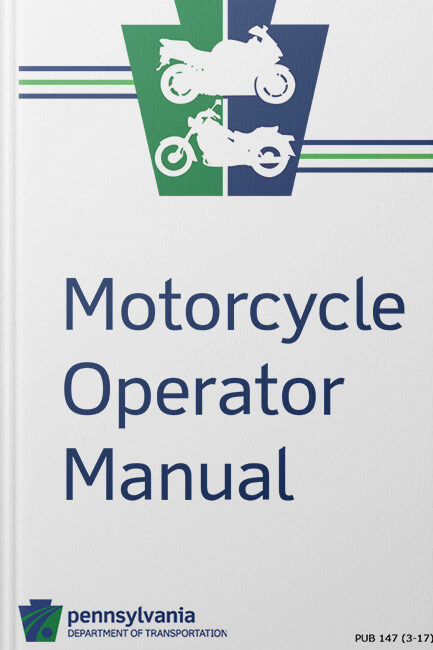Pennsylvania Motorcycle Manual Driver's Manual
To make studying easier, the Pennsylvania DOT handbook 2026 edition is available in multiple languages and comes with an audio version. Get interactive support with our AI assistant to clarify any complex terms.
Select your language
Pennsylvania Motorcycle Manual 2026
There are many reasons for wanting to ride a motorcycle.
You might be attracted to the convenience, the exhilaration, the freedom and the fun of being out on the open road. No matter what it is, the Pennsylvania Department of Transportation is dedicated to providing the necessary learning resources and programs to novice motorcyclists to ensure that all riders are safe and responsible on the road.
Motorcycle Safety Program
The Pennsylvania Motorcycle Safety Program has been designed to teach the basic skills required for safe operation of a motorcycle. Part of the learning process includes independent study with the PA Motorcycle Operator Manual, which will help you become an informed motorcyclist. The Pennsylvania Motorcycle Manual is available for free download below. Get started today and be one step closer to operating a motorcycle of your very own.
Preparing to Ride
Before heading out on a trip, you’ll need to make some preparations. The PA Motorcycle Operator Manual has the following recommendations for pre-trip practice:
- Gear – Make sure you’re wearing the right gear (helmet, face/eye protection, protective clothing, etc.). A proper helmet can go a long way to preventing serious injuries in case of a collision.
- Familiarity with your vehicle – Take the time to get familiar with your motorcycle. Make sure you know what equipment to check before you get on the road.
- Be responsible – Be aware of the major precautions you can take to prevent accidents on the road. This will make the driving environment safer for you and other drivers.
The SEE Strategy
The SEE strategy was developed by the Motorcycle Safety Foundation (MSF). It’s a three-step process that helps riders make good judgements and apply them correctly in various traffic situations. The SEE strategy is as follows:
- Search – Look ahead, to the sides, and behind your bike for potential hazards. Consider the amount of time/space you have and try to eliminate or reduce the harm that could occur.
- Evaluate – Consider how hazards (e.g. road characteristics, traffic control devices, other vehicles, etc.) can interact to create risk. Anticipate potential situations and have your escape route planned.
- Execute – Know the steps you’ll need to take in order to carry out your decision. This involves communicating with other drivers, adjusting your speed, and adjusting your position.
The SEE strategy and other techniques for defensive driving are outlined in detail in the Pennsylvania Motorcycle Operator Manual. It’s certainly worthwhile to spend time reviewing this valuable information.
